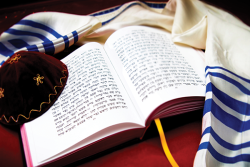The Gift of Grief
In an almost imperceptible yet seismic shift, this week’s Parshat Chukat jumps us a few decades ahead in the wilderness journey of the Israelites. Maybe we need a movie screen caption that reads, “thirty-eight years later.”
Rebelling in the Name of Heaven - or Not
Few issues touch the Reform Jewish soul like those of rebellion and authority. In our synagogues one sees teenagers wearing "Question Authority" buttons and hears adults affirming individual autonomy as the cardinal principal of Reform Judaism.
Rebel Without a Cause
A friend of mine once made the observation that America is a culture in which a person might scrawl graffiti on a wall that says "Challenge Authority," and another person will cross it out, Challenge Authority.
Summer Heat and Inner Warmth
Although the summer seems to be the season of rest and tranquillity, in truth, every reader of the Torah begins this time with a boiling conflict.
Evil Flourishes When Good People Do Nothing
The centerpiece of this week's portion, Korach, is Korach's challenge of Moses and Aaron's leadership. Dathan, Abiram, and two hundred and fifty elders join Korach in the revolt, claiming that they have an equal right to lead.

